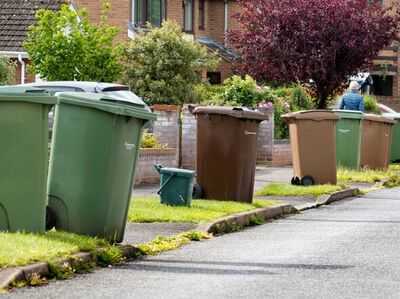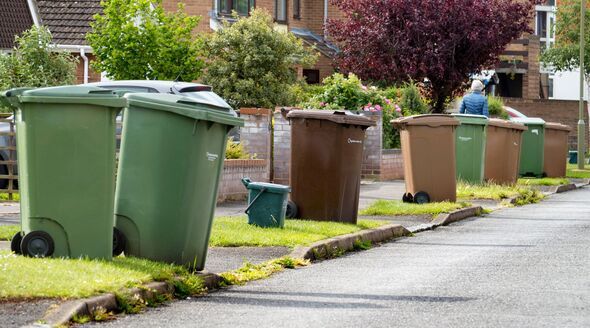

The date when key shift in recycling practices across England has been confirmed, with the aim of enhancing waste collection and recycling. The strategy includes the introduction of a new weekly, separate collection for household food waste to be implemented in 2026.
The strategy primarily focuses onhousehold waste and recycling, aiming to decrease waste production and align recycling rates with other local authorities nationwide. Research indicates that two thirds of the 135,000 tonnes of domestic rubbish incinerated each year could be recycled elsewhere.
Houses will have four separate waste containers from April 1, 2026, with local authorities needing toimplement a new, weekly food waste collection to reduce household waste. A substantial portion of all waste found in regular household bins is food waste, totalling 32.75%.
The new default requirement for most households and workplaces will be 4 containers for:New bin collection regulations across England are on the horizon as the Government rolls out its 'Simpler Recycling' plan.
Local authorities will launch campaigns to inform households about the upcoming changes, set to take effect from 1 April 2026. These include a new food waste collection service and an expanded range of materials that can be recycled in blue bins.
The strategy allows various receptacle types for waste, including bags, bins, or stackable boxes, giving councils latitude to cater to local requirements and ensuring a balanced approach to organising material collections for all homes and businesses in England.
The 'Simpler Recycling' strategy elaborates: "Councils and other waste collectors will still have the flexibility to make the best choices to suit local need. This is a sensible, pragmatic approach to the collection of materials for every household and business in England."
It also promises an end to confusion over recycling procedures, stating: "We will make recycling easier: citizens will be able to recycle the same materials across England whether at home, work or school, and will no longer need to check what is accepted for recycling in their local area. A universal standard will ensure that everything that can be collected for household recycling is collected in every region."
With deadlines set, weekly food waste collections are slated for implementation by 1 April 2026, while the Government plans to roll out kerbside plastic film collections from businesses, non-domestic premises, and households by 31 March 2027.
What is food waste?Food waste is any waste generated through the preparation of food, or where there are leftovers after a meal. This includes:
Cllr Liam Robinson, Leader of Liverpool City Council,is one of those preparing for the changes and earlier this year said: "We're committed to making Liverpool a cleaner, greener place to live and work, as well as reaching Net Zero across the city, and how we tackle our waste is a key component to helping us to reach that goal.
"Waste collection and processing makes up around 9% of the City's emissions. That is too high. This new strategy outlines important steps that both the Council and our communities can make to help us to reduce the amount of carbon we're releasing into the atmosphere.
"Reducing the amount of waste that we produce, and recycling as much of our rubbish as possible means that less gets sent to incinerators and more gets reused again and again. This could also lead to a significant cost saving for the Council, delivering best value for our residents.
"This new strategy is a major step towards us working together as a community to protect the environment for generations to come."